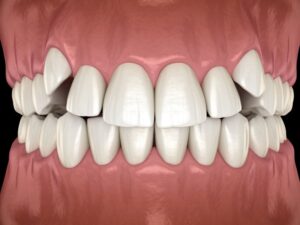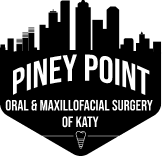
In most cases, discussions about impacted teeth center on the wisdom teeth, which are the last set of molars at the back of the mouth. But did you know that impaction can affect other teeth as well, including the canines? What exactly is an impacted canine tooth, and what can happen if this issue remains untreated? Continue reading to discover some important information about this dental health issue.
What Is an Impacted Canine Tooth?
The canine teeth are the pointy teeth toward the front of the mouth. You should have four of them; two on the bottom and two on the top. When these teeth develop normally, they fit in beautifully between the neighboring teeth and can play an important role in helping you bite your food.
In some cases, though, these teeth become impacted. In other words, they do not fully erupt from the gumline! They may get stuck either in the jawbone or in your gums, meaning they cannot function normally.
Impaction may occur if there is not enough space in the dental arch to accommodate the canine teeth. Impaction of the upper canines occurs more frequently than impaction of the lower canines.
Why Do Impacted Canine Teeth Need to be Treated?
Without treatment, impacted canine teeth may contribute to some significant problems, including:
- A misaligned bite. This can cause discomfort and chewing difficulties.
- Damage to nearby teeth. As impacted canines attempt to emerge from the gumline, they may place pressure on nearby teeth, leading to enamel damage.
- Infections. Pockets can form around impacted canine teeth. As the pockets collect bacteria and food particles, serious infections can result.
- Cysts and tumors. Rarely, cysts and tumors form around impacted canines. They can place pressure on nearby tissues and damage them.
- Aesthetic concerns. Impacted canines can adversely affect the way your smile looks!
Treatment Options for Impacted Canine Teeth
There are a few different ways to address impacted canine teeth. In some instances, orthodontia can be used to create space in the dental arch and encourage the canines to erupt fully. In some cases, this care is preceded by a surgery wherein an impacted tooth is exposed so an orthodontic bracket can be attached to it.
If the situation is severe enough, orthodontic treatment may not be adequate. It might be necessary for an oral surgeon to completely remove an impacted tooth. After a healing period, braces may be able to close any noticeable gaps left by the tooth removal.
Impacted canines are nothing to take lightly! If you or your child has this issue, you should consult with an oral surgeon to learn about your next steps.
Meet the Practice
Drs. Steve Koo and William Shepard have many years of combined experience. These expert, board-certified oral surgeons are not afraid to take on even complex cases of tooth impaction. If you have concerns about the positioning of your canine teeth, they and our team are ready to consult with you. Contact our Katy office at 832-353-1100.

